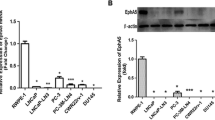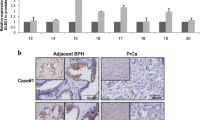Abstract
Introduction:
p21WAF1/CIP1 may act as a tumour suppressor gene (TSG) and loss of the p21WAF1/CIP1 gene has been reported in several solid tumours. The aim of this study was to see whether p21WAF1/CIP1 was expressed in metastatic prostate cancer cell lines and to determine if there was methylation of the p21WAF1/CIP1 promoter.
Method:
PC3, LNCaP and DU145 metastatic prostate cancer cell lines, 1542NP normal prostate, and RD rhabdomyosarcoma cell lines were cultured in the demethylating agent 5-Aza-2 deoxycytidine (5-Aza-CdR). p21WAF1/CIP1 mRNA expression was analysed by RT-PCR. DNA from untreated cell lines was modified with sodium bisulphite and promoter sequencing was performed.
Results:
p21WAF1/CIP1 was expressed at low or undetectable levels in metastatic prostate cancer cell lines but expression was reactivated by treatment with 5-Aza-CdR. Sequence analysis of the promoter region revealed several sites of methylation at the 5′ end of a CpG island in the PC3, LNCaP and DU145 cell line DNA but not in the normal prostate control DNA. Most notably the Sis-inducible element (SEI)-1—a STAT1-binding site, was methylated.
Conclusions:
In this study, we show that p21WAF1/CIP1 expression in metastatic prostate cancer cell lines is enhanced as a result of demethylation of the DNA. Furthermore, several cytosine residues in the promoter region are methylated, including critical binding sites. The inhibition of the STAT1-signalling pathway by methylation of the promoter may inactivate the p21WAF1/CIP1 TSG in prostate cancer.




Similar content being viewed by others
References
el Deiry WS et al. WAF1, a potential mediator of p53 tumor suppression. Cell 1993; 75: 817–825.
Harper JW et al. The p21 Cdk-interacting protein Cip1 is a potent inhibitor of G1 cyclin-dependent kinases. Cell 1993; 75: 805–816.
Datto MB et al. Transforming growth factor beta induces the cyclin-dependent kinase inhibitor p21 through a p53-independent mechanism. Proc Natl Acad Sci USA 1995; 92: 5545–5549.
Chin YE et al. Activation of the STAT signaling pathway can cause expression of caspase 1 and apoptosis. Mol Cell Biol 1997; 17: 5328–5337.
Xu X, Fu XY, Plate J, Chong AS . IFN-gamma induces cell growth inhibition by Fas-mediated apoptosis: requirement of STAT1 protein for up-regulation of Fas and FasL expression. Cancer Res 1998; 58: 2832–2837.
Gartel AL, Tyner AL . Transcriptional regulation of the p21((WAF1/CIP1)) gene. Exp Cell Res 1999; 246: 280–289.
Bellido T, O’Brien CA, Roberson PK, Manolagas SC . Transcriptional activation of the p21(WAF1,CIP1,SDI1) gene by interleukin-6 type cytokines. A prerequisite for their pro-differentiating and anti-apoptotic effects on human osteoblastic cells. J Biol Chem 1998; 273: 21137–21144.
Chin YE et al. Cell growth arrest and induction of cyclin-dependent kinase inhibitor p21 WAF1/CIP1 mediated by STAT1. Science 1996; 272: 719–722.
Li R et al. Differential effects by the p21 CDK inhibitor on PCNA-dependent DNA replication and repair. Nature 1994; 371: 534–537.
Chen J, Jackson PK, Kirschner MW, Dutta A . Separate domains of p21 involved in the inhibition of Cdk kinase and PCNA. Nature 1995; 374: 386–388.
Dotto GP . p21(WAF1/Cip1): more than a break to the cell cycle? Biochim Biophys Acta 2000; 1471: M43–M56.
Hirama T, Koeffler HP . Role of the cyclin-dependent kinase inhibitors in the development of cancer. Blood 1995; 86: 841–854.
Toyoshima H, Hunter T . p27, a novel inhibitor of G1 cyclin-Cdk protein kinase activity, is related to p21. Cell 1994; 78: 67–74.
DiGiuseppe JA et al. p53-independent expression of the cyclin-dependent kinase inhibitor p21 in pancreatic carcinoma. Am J Pathol 1995; 147: 884–888.
Noda H et al. Growth pattern and expressions of cell cycle regulator proteins p53 and p21WAF1/CIP1 in early gastric carcinoma. Cancer 2001; 92: 1828–1835.
Shariat SF et al. p53, p21, pRB, and p16 expression predict clinical outcome in cystectomy with bladder cancer. J Clin Oncol 2004; 22: 1014–1024.
Shoji T et al. Clinical significance of p21 expression in non-small-cell lung cancer. J Clin Oncol 2002; 20: 3865–3871.
Cheng L et al. The cell cycle inhibitors p21WAF1 and p27KIP1 are associated with survival in patients treated by salvage prostatectomy after radiation therapy. Clin Cancer Res 2000; 6: 1896–1899.
Matsushima H et al. Immunohistochemical study of p21WAF1 and p53 proteins in prostatic cancer and their prognostic significance. Hum Pathol 1998; 29: 778–783.
Shiohara M et al. Absence of WAF1 mutations in a variety of human malignancies. Blood 1994; 84: 3781–3784.
Roman-Gomez J et al. 5′ CpG island hypermethylation is associated with transcriptional silencing of the p21(CIP1/WAF1/SDI1) gene and confers poor prognosis in acute lymphoblastic leukemia. Blood 2002; 99: 2291–2296.
Strathdee G, Brown R . Aberrant DNA methylation in cancer: potential clinical interventions. Exp Rev Mol Med 2002. http://www-ermm.cbcu.cam.ac.uk/02004222a.pdf.
Chen B et al. Inhibition of the interferon-gamma/signal transducers and activators of transcription (STAT) pathway by hypermethylation at a STAT-binding site in the p21WAF1 promoter region. Cancer Res 2000; 60: 3290–3298.
Sherr CJ, Roberts JM . CDK inhibitors: positive and negative regulators of G1-phase progression. Genes Dev 1999; 13: 1501–1512.
Chan FK et al. Identification of human and mouse p19, a novel CDK4 and CDK6 inhibitor with homology to p16ink4. Mol Cell Biol 1995; 15: 2682–2688.
Serrano M, Hannon GJ, Beach D . A new regulatory motif in cell-cycle control causing specific inhibition of cyclin D/CDK4. Nature 1993; 366: 704–707.
Hirai H et al. Novel INK4 proteins, p19 and p18, are specific inhibitors of the cyclin D-dependent kinases CDK4 and CDK6. Mol Cell Biol 1995; 15: 2672–2681.
Matsuoka S et al. p57KIP2, a structurally distinct member of the p21CIP1 Cdk inhibitor family, is a candidate tumor suppressor gene. Genes Dev 1995; 9: 650–662.
Kibel AS et al. Identification of 12p as a region of frequent deletion in advanced prostate cancer. Cancer Res 1998; 58: 5652–5655.
Guo Y, Sklar GN, Borkowski A, Kyprianou N . Loss of the cyclin-dependent kinase inhibitor p27(Kip1) protein in human prostate cancer correlates with tumor grade. Clin Cancer Res 1997; 3: 2269–2274.
Cote RJ et al. Association of p27Kip1 levels with recurrence and survival in patients with stage C prostate carcinoma. J Natl Cancer Inst 1998; 90: 916–920.
Jarrard DF et al. Deletional, mutational, and methylation analyses of CDKN2 (p16/MTS1) in primary and metastatic prostate cancer. Genes Chromosomes Cancer 1997; 19: 90–96.
Darnell Jr JE . STATs and gene regulation. Science 1997; 277: 1630–1635.
TFSEARCH: Searching Transcription Factor Binding Sites (ver 1.3) 2004; http://molsun1.cbrc.aist.go.jp/research/db/TFSEARCH.html; (Ref Type: Electronic Citation).
Gaboli M et al. Mzf1 controls cell proliferation and tumorigenesis. Genes Dev 2001; 15: 1625–1630.
Morris JF et al. The myeloid zinc finger gene, MZF-1, regulates the CD34 promoter in vitro. Blood 1995; 86: 3640–3647.
Hromas R et al. Hematopoietic transcriptional regulation by the myeloid zinc finger gene, MZF-1. Curr Top Microbiol Immunol 1996; 211: 159–164.
Narla G et al. KLF6, a candidate tumor suppressor gene mutated in prostate cancer. Science 2001; 294: 2563–2566.
Bucher P . Weight matrix descriptions of four eukaryotic RNA polymerase II promoter elements derived from 502 unrelated promoter sequences. J Mol Biol 1990; 212: 563–578.
Acknowledgements
Simon Bott is kindly sponsored by a BUF/AstraZeneca scholarship.
Author information
Authors and Affiliations
Corresponding author
Rights and permissions
About this article
Cite this article
Bott, S., Arya, M., Kirby, R. et al. p21WAF1/CIP1 gene is inactivated in metastatic prostatic cancer cell lines by promoter methylation. Prostate Cancer Prostatic Dis 8, 321–326 (2005). https://doi.org/10.1038/sj.pcan.4500822
Received:
Revised:
Accepted:
Published:
Issue Date:
DOI: https://doi.org/10.1038/sj.pcan.4500822
- Springer Nature Limited
Keywords
This article is cited by
-
Multiple functions of p21 in cancer radiotherapy
Journal of Cancer Research and Clinical Oncology (2021)
-
The effects of phenoxodiol on the cell cycle of prostate cancer cell lines
Cancer Cell International (2014)
-
Association of mutation and hypermethylation of p21 gene with susceptibility to breast cancer: a study from north India
Molecular Biology Reports (2014)
-
Inhibitor of differentiation 4 (Id4) is a potential tumor suppressor in prostate cancer
BMC Cancer (2009)




